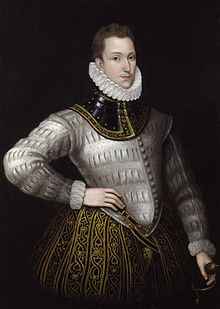Who is Sir Philip Sidney
Sir Philip Sidney (30 November 1554 – 17 October 1586) was an English poet, courtier, scholar and soldier who is remembered as one of the most prominent figures of the Elizabethan age. His works include Astrophel and Stella, The Defence of Poesy (also known as The Defence of Poetry or An Apology for Poetry) and The Countess of Pembroke's Arcadia.Early life
Born at Penshurst Place, Kent, of an aristocratic family, he was educated at Shrewsbury School and Christ Church, Oxford. He was the eldest son of Sir Henry Sidney and Lady Mary Dudley. His mother was the eldest daughter of John Dudley, 1st Duke of Northumberland, and the sister of Robert Dudley, 1st Earl of Leicester. His younger brother, Robert Sidney was a statesman and patron of the arts, and was created E...
Read Full Biography of Sir Philip Sidney
Sir Philip Sidney Poems
- Sonnet 101: Stella Is Sick
Stella is sick, and in that sickbed lies
Sweetness, which breathes and pants as oft as she:
And Grace, sick too, such fine conclusions tries
That Sickness brags itself best grac'd to be. ... - Sonnet 102: Wher Be Those Roses Gone
Where be those roses gone, which sweeten'd so our eyes?
Where those red cheeks, which oft with fair increase did frame
The height of honor in the kindly badge of shame?
Who hath the crimson weeds stol'n from my morning skies? ... - Sonnet Xi: In Truth, Oh Love
In truth, oh Love, with what a boyish kind
Thou doest proceed in thy most serious ways:
That when the heav'n to thee his best displays,
Yet of that best thou leav'st the best behind. ... - Astrophel And Stella: Xcii
Be your words made, good sir, of Indian ware,
That you allow me them by so small rate?
Or do you cutted Spartans imitate?
Or do you mean my tender ears to spare, ... - Sonnet 77: Those Looks, Whose Beams Be Joy
Those looks, whose beams be joy, whose motion is delight,
That face, whose lecture shows what perfect beauty is:
That presence, which doth give dark hearts a living light:
That grace, which Venus weeps that she herself doth miss: ...
Top 10 most used topics by Sir Philip Sidney
Sonnet 122 I Love You 119 Love 119 Heart 91 Sweet 55 Nature 46 Face 45 Light 44 Place 43 Good 42Sir Philip Sidney Quotes
- Alexander received more bravery of mind by the pattern of Achilles, than by hearing the definition of fortitude.
- In forming a judgment, lay your hearts void of foretaken opinions; else, whatsoever is done or said, will be measured by a wrong rule; like them who have jaundice, to whom everything appears yellow.
- They are never alone that are accompanied with noble thoughts.
- But words came halting forth, wanting Inventions stay Invention, Natures child, fled step-dame Studys blows... Biting my truant pen, beating myself for spite, Fool, said my Muse to me look in thy heart and write.
- All is but lip-wisdom which wants experience.
Comments about Sir Philip Sidney
Fracturedlilac: two blue jays feeding outside my window chased away by a squirrel so gray while studying sir philip sidney and the influence of duplessis-mornay among some other french huguenots makes for a great start today!007kurwa: sir philip sidney invented the name pamela for a pivotal character in his epic prose work, the countess of pembroke's arcadia, written in the late 16th century and published posthumously.
Kmwan35851: my true-love hath my heart and i have his, by just exchange one for the other given: i hold his dear, and mine he cannot miss; there never was a bargain better driven.,philip sidney, the poems of sir philip sidney,heart, love, poetry,
Indian_anchors: they are never alone that are accompanied with noble thoughts. ~sir philip sidney
Welfordwrites: sad steps, a poem by philip larkin. inspired by a 16th century poem by sir philip sidney, larkin comes to very different conclusions.
Read All Comments
